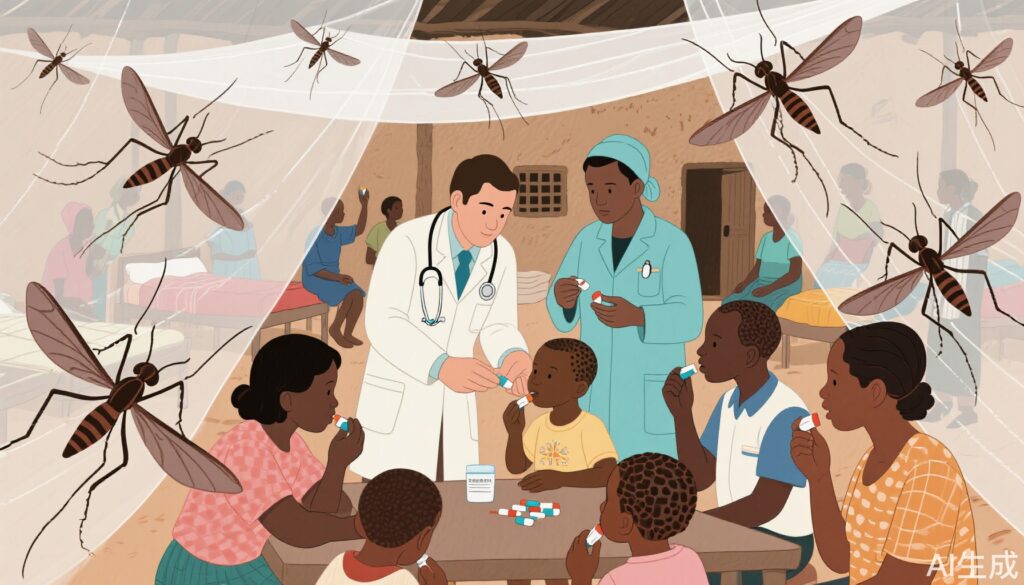Highlights
- Mass administration of ivermectin in high malaria endemic settings results in modest reductions in malaria incidence, but effects may be context-dependent.
- Ivermectin was well-tolerated, with no increase in serious adverse events compared to controls in both studies.
- No significant reduction in malaria transmission was observed in a setting with high coverage of next-generation insecticide-treated nets and seasonal malaria chemoprevention.
- Entomological data suggest transient effects on mosquito survival, with unclear impact on overall transmission dynamics.
Clinical Background and Disease Burden
Malaria remains among the most significant infectious diseases globally, particularly in sub-Saharan Africa, where transmission is intense and persistent. Control strategies have historically relied on insecticide-treated nets (ITNs), indoor residual spraying, and chemoprevention. However, increasing insecticide resistance and adaptive changes in mosquito behavior threaten the long-term effectiveness of these interventions. The persistent burden of malaria, especially in highly endemic regions like Kenya and Burkina Faso, underscores the need for novel vector control approaches. Ivermectin, a broad-spectrum antiparasitic, has emerged as a promising candidate due to its lethal effect on mosquitoes feeding on treated humans, offering a unique community-level vector control mechanism.
Research Methodology
Two recent cluster-randomized trials evaluated the efficacy and safety of mass ivermectin administration (MDA) for malaria control in African settings.
1. Kenya (Kwale County): In a highly endemic, high bed-net coverage region, 84 household clusters (28,932 participants) were randomized to receive either monthly ivermectin (400 μg/kg) or albendazole (400 mg, active control) for 3 months at the onset of the short rainy season. Children aged 5–15 years were tested monthly for malaria over 6 months. The primary outcomes were malaria infection incidence and adverse events.
2. Burkina Faso (RIMDAMAL II): In 14 villages, a phase 3, double-blind, placebo-controlled, cluster-randomized trial was conducted during two rainy seasons. Eligible participants (≥90 cm height, no age restriction) received either high-dose oral ivermectin (three daily doses, ~300 μg/kg) or placebo monthly for up to eight rounds, alongside routine seasonal malaria chemoprevention (SMC) for children and deployment of new dual-chemistry ITNs. The primary outcome was weekly malaria incidence in children ≤10 years, with entomological and hematological secondary endpoints.
Key Findings
Kenya Trial:
– The cumulative malaria incidence in children 5–15 years was 2.20 per child-year in the ivermectin group versus 2.66 per child-year in the albendazole group.
– The adjusted incidence rate ratio (IRR) was 0.74 (95% CI, 0.58–0.95; P=0.02), indicating a 26% reduction in malaria incidence.
– No significant difference in serious adverse events was observed between groups (IRR 0.63; 95% CI, 0.21–1.91).
Burkina Faso Trial:
– The weekly malaria incidence per 100 person-weeks in children ≤10 years was 1.78 (ivermectin) vs. 1.84 (placebo), with an IRR of 0.96 (95% CI, 0.58–1.59; P=0.87), indicating no statistically significant reduction.
– Adverse events were less frequent in the ivermectin group (risk ratio 0.63, 95% CI 0.46–0.87; P=0.0049).
– Entomological data showed reduced mosquito survival one week post-MDA, but this effect dissipated by week three, and overall entomological inoculation rates (EIRs) did not differ between groups.
– Hemoglobin improvement was greater in ivermectin-treated children in 2020.
Mechanistic Insights and Biological Plausibility
Ivermectin’s primary vector control mechanism is its ability to reduce mosquito survival following ingestion of blood from treated individuals. This effect is transient, requiring repeated dosing to maintain community-level impact. While laboratory and modeling studies indicate potential for transmission reduction, real-world effectiveness appears to depend on concurrent vector control measures (e.g., ITNs, SMC) and the timing and frequency of ivermectin dosing. The transient nature of the mosquito-killing effect, as noted in the Burkina Faso trial, suggests that monthly dosing may be insufficient to suppress local vector populations when highly effective ITNs and chemoprevention are in use.
Expert Commentary
The recent trials illustrate both the promise and the complexity of integrating endectocides into malaria control programs. As summarized by Chaccour et al. (2025), even a modest reduction in malaria incidence could be meaningful in high-burden settings with limited alternative strategies. However, as noted by Foy and Dabiré (2025), the additive benefit of ivermectin is likely to diminish where ITNs and SMC are already optimized. The safety profile across diverse populations is reassuring, supporting feasibility for large-scale mass drug administration campaigns.
Controversies and Limitations
Several limitations should be acknowledged:
– Generalizability may be limited to similar high-endemicity, high-intervention settings; results may differ in areas with lower ITN coverage.
– The transient effect on mosquito survival and lack of long-term entomological impact question the sustainability of ivermectin’s benefits without more frequent dosing or integration with other interventions.
– Both trials were not powered to detect rare adverse events; ongoing pharmacovigilance is warranted.
– The diversity of Plasmodium species observed in Burkina Faso and potential behavioral adaptations in vectors may reduce the predictability of ivermectin’s impact.
Conclusion
Mass ivermectin administration can lead to modest reductions in malaria incidence in certain high-burden settings, with a favorable safety profile. However, in areas with comprehensive vector control coverage, the additional benefit appears limited and transient. Future research should explore alternative dosing schedules, synergistic combinations with other interventions, and operational feasibility in varied transmission settings. Ivermectin is not a replacement for established control measures but may serve as a valuable adjunct, particularly where resistance or operational gaps persist.
References
1. Chaccour C, Maia M, Kariuki M, et al. Ivermectin to Control Malaria – A Cluster-Randomized Trial. N Engl J Med. 2025 Jul 24;393(4):362-375. doi: 10.1056/NEJMoa2411262.
2. Somé AF, Somé A, Sougué E, et al. Safety and efficacy of repeat ivermectin mass drug administrations for malaria control (RIMDAMAL II): a phase 3, double-blind, placebo-controlled, cluster-randomised, parallel-group trial. Lancet Infect Dis. 2025 Jul;25(7):737-750. doi: 10.1016/S1473-3099(24)00751-5.
3. WHO. World Malaria Report 2023. Geneva: World Health Organization; 2023.


